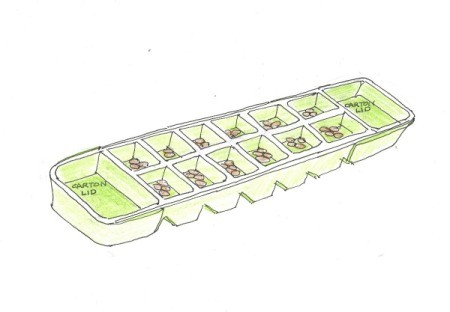"Thank you soooooo much for allowing us to do that!" said many of my students after a class period of playing Mancala. We'd been studying African literature - in particular "Sundiata," a tale from Mali, where the cruel king killed everyone who played the game with him and lost.
Mancala is considered one of the oldest games in the world and is played just about everywhere nowadays - by the wealthy on beautifully carved ivory boards covered in gold, and by children who dig holes in the earth and use pebbles or seeds as playing pieces. When my students played, they used dried beans and empty egg cartons.
Should you choose to play the game as my students did, here's how to begin:
Place the board (egg carton) horizontally between you and your opponent. Then each of you takes 24 playing pieces (beans) and puts four of them in each of the six egg "cups" on your side of the carton. The two larger bins at each end of the carton (made from the halved lids of the egg container and called Kalahas) are left empty at the start of the game.
If you are the first player, scoop up all the beans from any one of the six cups on your side of the egg carton. Now, moving to your right, drop one bean into each cup you come to, including your Kalaha (the one on the right) and continue to drop one bean into each cup on your opponent's side. Skip her Kalaha, however. If the last bean in your hand lands in your Kalaha, you get to go again; otherwise, it's your opponent's turn.
If the last bean that you drop gets into an empty cup on your side of the carton, you get to capture any of your opponent's beans in the cup directly across from yours. When you capture these beans, you take all of them, along with your single bean that did the capturing, and you put them into your Kalaha. It's then your opponent's turn.
The game is over when all six cups on either your side or your opponent's side are empty. When this happens, the player who still has beans in her cups gets to move all of these beans into her Kalaha. The winner, the one with the most beans in her Kalaha, can say "Nashinda", which means "I've won!" in Swahili.
Perhaps you would like to play at home with your children or grandchildren. I think they'd enjoy egg carton Mancala as much as my students did, and you could begin and enjoy almost at a moment's notice.
By Viaux from Miami, FL

Add your voice! Click below to comment. ThriftyFun is powered by your wisdom!
Great article! Our 3rd grader loves Mancala Games so much we decided to start making hardwood Mancala board games!
Add your voice! Click below to comment. ThriftyFun is powered by your wisdom!